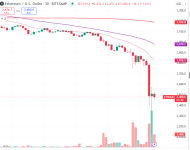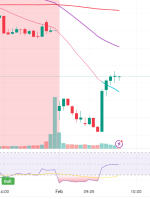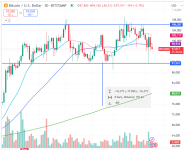When I was a child, my family took an annual road trip from Ohio to Maine and back. It was a different era. No cell phones to call for help if something went wrong with the car. Paper maps and directions written on scraps of paper, instead of a phone app to give you step-by-step directions. Forget hopping on the web to book a hotel; you just had to look for signs in the distance and stop in to see if there was a vacancy. No podcasts or audiobooks, just a scratchy radio straining to find a local station. Instead of watching videos on screens in the back, my brothers and I were scanning passing cars’ license plates to “collect” the states in a no-tech road-trip game. Road trips are very different these days. In most ways, technology has made them a more enjoyable and less risky endeavor.
The crypto road trip on which the newly announced Crypto Task Force
[1] has embarked likewise should be more enjoyable and less risky than the crypto road trip the Commission has taken the industry on for the last decade. On that last trip, the Commission refused to use regulatory tools at its disposal and incessantly slammed on the enforcement brakes as it lurched along a meandering route with a destination not discernible to anyone. But just as modern technology does not eliminate the risks of taking to the open road, this new journey toward regulatory clarity still presents dangers, and both the Commission and the public need to stay alert and aware of the risks and opportunities that may lie ahead. I am delighted to be accompanied on the journey by a wonderful team of talented SEC staff, and we look forward to engaging with many enthusiastic members of the public who will help us navigate on this journey. With all that assistance, I am hopeful that we will arrive at a place that is better than we could have imagined as we were careening down the road on the previous crypto road trip. Before I discuss the promise and opportunity the task force represents, let me offer some important disclaimers.
First, despite now being charged with leading the SEC’s new Crypto Task Force, the views that I express are my own as a Commissioner and not necessarily those of the SEC or my fellow Commissioners. Commission positions always require a vote of the Commission.
Second, it took us a long time to get into this mess, and it is going to take us some time to get out of it. The Commission has engaged with the crypto industry in one form or another for more than a decade. The first bitcoin exchange-traded product application hit our doorstep in 2013, and the Commission brought a fraud case that had a tangential crypto element that same year.
[2] In 2017, we issued the DAO Section 21(a) report, which reflected the first application of the
Howey test in this context.
[3] Since then, there have been many enforcement actions, a number of no-action letters, some exemptive relief, endless talk about crypto in speeches and statements, lots of meetings with crypto entrepreneurs many inter-agency and international crypto working groups, discussion of certain aspects of crypto in rulemaking proposals, consideration of crypto-related issues in reviews of registration statements and other filings, and approval of numerous SRO proposed rule changes to list crypto exchange-traded products. Throughout this time, the Commission’s handling of crypto has been marked by legal imprecision and commercial impracticality. Consequently, many cases remain in litigation, many rules remain in the proposal stage, and many market participants remain in limbo. Determining how best to disentangle all these strands, including ongoing litigation, will take time. It will involve work across the whole agency and cooperation with other regulators. Please be patient. The Task Force wants to get to a good place, but we need to do so in an orderly, practical, and legally defensible way.
Third, the Task Force wants to travel to a destination where people have great freedom to experiment and build interesting things, and which will not be a haven for fraudsters. One of the reasons the U.S. capital markets are so robust, efficient, and effective is that we have rules designed to protect investors and the integrity of the marketplace, and we enforce those rules. We do not tolerate liars, cheaters, and scammers. As the Task Force works to help develop this regulatory framework, it will give careful consideration to antifraud protections. If the Commission spots fraud that lies outside our jurisdiction, it can refer the matter to a sister regulator. If it does not fall within any regulator’s jurisdiction, the Commission can bring that gap to Congress’s attention.
Fourth, the Task Force is working to help create a regulatory framework that both achieves the Commission’s important regulatory objectives—including protecting investors—and preserves industry’s ability to offer products and services. This framework will be within the statutory authority given to the Commission, and we will work with other regulators operating within their own statutory authorities. The statutes already on the books do not allow a free-for-all for products that fall within our jurisdiction. Congress has put parameters in place, and the Commission will apply them. Congress also has given us exemptive authority, and the Commission will use it, as appropriate. Where Congress has directed the Commission to impose requirements on market participants, SEC rules will not let you do whatever you want, whenever you want, however you want. Some of these rules will impose costs and other compliance burdens that some may find irritating, and the Commission will use its enforcement tools when necessary to pursue noncompliance.
Fifth, the Commission staff is working hard to process applications for exemptive relief, requests for no-action letters, and registration statements, but an uptick in the volume is likely to prove challenging. Adherence to technical and legal requirements, well-reasoned legal analysis, and thorough and timely responses to staff questions help to conserve Commission resources and makes for a quicker, smoother trip toward the destination of greater regulatory clarity. As always, such diligence will help an application move through the approval process more smoothly; conversely, the absence of it may cause unnecessary delays. Being first in the door may not mean being first out the door.
Sixth, the new commitment to a better regulatory environment should not be viewed as an endorsement of any crypto coin or token. Regardless of whether those tokens or coins fall within our jurisdiction, the Commission
never endorses any product or service; there is no such thing as an SEC seal of approval. Spinning up coins and tokens is easy. If people want to buy a token or product that lacks a clear long-term value proposition, they should feel free to but should not be surprised if someday the price drops. In this country, people generally have a right to make decisions for themselves, but the counterpart to that wonderful American liberty is the equally wonderful American expectation that people
must decide for themselves, not look to Mama Government to tell them what to do or not to do, nor to bail them out when they do something that turns out badly.
Now, with those rather gruff disclaimers out of the way, let’s talk a bit about what the Task Force is working on with staff across the Commission’s policy divisions. We will collaborate with others across the federal government, with state securities regulators, and with our international counterparts. We invite builders, enthusiasts, and skeptics to engage with us to figure out what the final rules should be and what interim steps might help to foster innovation in the meantime. The Commission staff already has achieved one milestone—the rescission of Staff Accounting Bulletin 121—but there is much more to do.
[4] This list is not exhaustive, nor is it presented in order of priority or order of expected completion.
- Security Status: The status of crypto assets under the securities laws is fundamental to resolving many other questions. The Task Force is working hard to examine different types of crypto assets.
- Scoping Out: The Task Force will work to help identify some areas that fall outside the Commission’s jurisdiction. As an initial step, the staff welcomes requests for no-action letters. No-action letters typically come in the form of a staff statement addressing specific circumstances spelled out in the letter under which the staff will not recommend enforcement action to the Commission. This statement is specific to the particular circumstances but gives the broader public a helpful window into the staff’s thinking.
- Coin and Token Offerings: The Task Force also is thinking about the possibility of recommending Commission action to provide temporary prospective and retroactive relief for coin or token offerings for which the issuing entity or some other entity willing to take responsibility provides certain specified information, keeps that information updated, and agrees not to contest the Commission’s jurisdiction in the event of a case alleging fraud in connection with the purchase and sale of the asset. These tokens would be deemed to be non-securities and thus there would be no uncertainty as to whether they would be able to trade freely on secondary markets not registered with the SEC as long as the information is kept up-to-date and accurate. This approach would bridge the gap until a more permanent rule or legislation could be finalized. It would provide a pathway for existing tokens to find their way out of the fog of uncertainty that obscures a feasible path forward and would encourage the provision of greater disclosure.
- Registered Offerings: The Task Force will consider working with staff to recommend that the Commission modify existing paths to registration, including Regulation A and crowdfunding, so that people interested in registering token offerings will have a viable path for doing so.
- Special Purpose Broker Dealer: The Task Force will explore possible updates to the special-purpose broker dealer no-action statement, which in its current form has not been a success. An initial change we may suggest is that the statement be expanded to cover broker-dealers that custody crypto asset securities alongside crypto assets that are not securities. We will work with the public to identify other obstacles to registration.
- Custody Solutions for Investment Advisers: We will work with investment advisers to provide an appropriate regulatory framework within which advisers can safely, legally, and practically custody client assets themselves or with a third-party.
- Crypto-Lending and Staking: We need to provide clarity about whether crypto-lending and staking programs are covered by the securities laws and, if so, how. We plan to work to help address how such programs can be structured consistent with the law.
- Crypto Exchange-Traded Products: The Commission already is receiving SRO proposed rule changes to list new types of crypto exchange-traded products. The Task Force will work with the staff to provide clear statements about the approach used when approving or disapproving these applications. The Task Force will also assist the staff and the Commission in considering requests to modify certain features of existing exchange-traded products, including to allow for staking and in-kind creations and redemptions. Before these changes can be operationalized, however, the Commission may have to make progress on custody and other issues.
- Clearing Agencies and Transfer Agents: The Task Force also plans to work on the intersection of crypto and clearing agency and transfer agent rules. We will continue to work with market participants interested in tokenizing securities or otherwise using blockchain technology to modernize traditional financial markets.
- Cross-Border Sandbox: Many crypto projects are international in scope. The Task Force is considering ways to facilitate cross-border experimentation on a limited scale and temporary timeframe, with the possibility of more permanent, long-term approaches.
This brief overview of how the Task Force is looking at the journey ahead is not exhaustive or definitive, but I hope it has piqued your interest. Although the obstacles to getting to our final destination of a sensible, clear ruleset are daunting, if we collaborate, the journey will be exhilarating and rewarding. This is the beginning of the conversation—one we do not want to have just with ourselves. Please visit our Crypto Task Force
webpage to follow what the Task Force is doing and to engage with the Task Force.

















